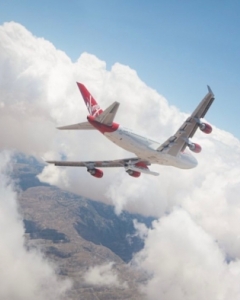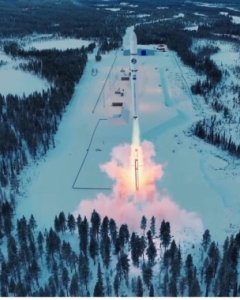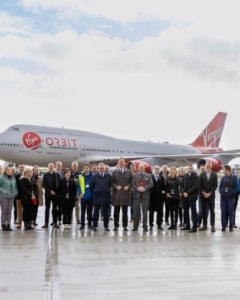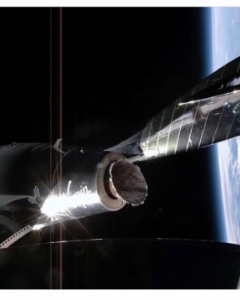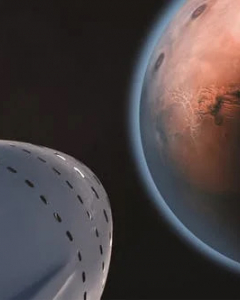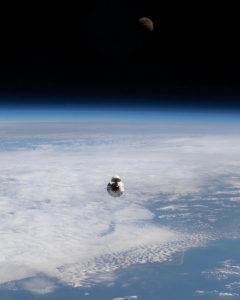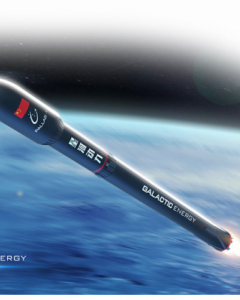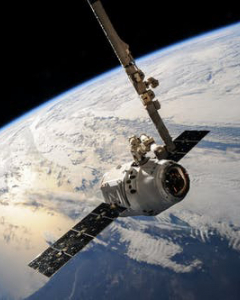Korea: the 7th country participating in the race to Space
In the last days of March, Korea successfully launched the first new generation mid-range CAS500 satellite. This is a historic step for the Korean space industry, showing that Seoul is ready to catch up with the global trend of space exploration.
The new generation 1 medium-sized geostationary orbit satellite weighs about 500kg, is equipped with a high-precision photoelectric camera that can take pictures of cars at an altitude of 500km above the Earth's surface. In the next 4 years, this satellite will be used for many different purposes such as resource management and disaster control.
Usually, it takes more than $270 million and 7 years to develop a satellite of such level, but Seoul only costs $140 million over a five-year period. Notably, 91% of the key components of the satellite are produced by technology "made in Korea", the design of the satellite's body and system is based on domestic technology.
 Seoul plans to launch the first satellite-mounted boosters in October this year. / ph: KARI
Seoul plans to launch the first satellite-mounted boosters in October this year. / ph: KARI
Since the development of satellites began in the 1990s, Korea has produced 16 small satellites. This time, however, Seoul has successfully produced a mid-sized satellite, in cooperation with the Korea Aerospace Research Institute (KARI), a state agency and private enterprises.
Based on technology transfer from KARI, Korea Aerospace Industry Corporation (KAI) is responsible for the entire development and launch of another medium-sized satellite scheduled for the first half of next year. Seoul also plans to launch the first satellite-mounted boosters in October this year. If the test is successful, Korea will become the 7th country in the world to own the technology to launch satellites into space, after the US, Russia, Europe, China, Japan and India.
The space industry and the space industry are often not as far-fetched as many might imagine. Not only rocket launches or manned spacecraft, the space industry is now seen from a business standpoint. Morgan Stanley Investment Bank estimates the size of the global space industry to reach $1 trillion by 2040.
The administration of former US President Donald Trump has initiated the Artemis program, which brings astronauts back to the Moon. Private companies like the SpaceX of American billionaire Elon Musk, or Virgin Galactic and the Boeing Group are actively exploring the space. Thanks to the development of related technologies, space taxis or space travel will no longer be the curiosity of the few but will gradually become popular, as a service to the public.
China and Russia are working hard to build a joint space station to fly to the Moon, cooperating to explore the Moon and Mars. The US, Australia and the European Union (EU) are also cooperating in space development.
Korea is also accelerating to develop its own space technology. Seoul has recently announced its space development strategy, aiming to become the 7th developed space country in the world. South Korea plans to put the satellite in lunar orbit for the first time next year and realize the dream of moon landing in 2030.
Korea: the 7th country participating in the race to Space
Breaking News: The Business magnate Richard Branson’s Virgin Orbit filed for Bankruptcy
Richard Branson's satellite launch company, Virgin Orbit, has filed for bankruptcy after it was unable to secure long-term funding to recover from its failed launch in January of this year.
Richard Branson\'s satellite launch company, Virgin Orbit, has filed for bankruptcy after it was unable to secure long-term funding to recover from its failed launch in January of this year.
Read moreSweden inaugurates Mainland Europe's 1st Satellite launch Spaceport
Sweden inaugurated a new spaceport worth $16.3 million as many European countries are competing to be the first country outside of Russia to put a satellite into orbit from continental Europe.
Sweden inaugurated a new spaceport worth $16.3 million as many European countries are competing to be the first country outside of Russia to put a satellite into orbit from continental Europe.
Read moreUK issues first Spaceport license
On November 16, the British Government granted the license for the first spaceport, paving the way for the country's first satellite launch this year.
On November 16, the British Government granted the license for the first spaceport, paving the way for the country\'s first satellite launch this year.
Read moreChina launches Space Tourism by 2025
China is likely to start selling tickets for suborbital space tourism by 2025 with prices ranging from $280,000 to $430,000.
China is likely to start selling tickets for suborbital space tourism by 2025 with prices ranging from $280,000 to $430,000.
Read moreChina starts to join Space Tourism
China is launching a test program of space tourism flights, kicking off the race in the world's space tourism industry.
China is launching a test program of space tourism flights, kicking off the race in the world\'s space tourism industry.
Read moreCan plants grow on the Moon?
For the first time, plants can germinate and grow in soil taken from the Moon in a landmark test just published.
For the first time, plants can germinate and grow in soil taken from the Moon in a landmark test just published.
Read moreSpaceX could hit $127B Valuation with Latest 1.7 bln Funding round
SpaceX, the space exploration company of the world's richest billionaire Elon Musk, is conducting a new round of fundraising. The valuation of the company that SpaceX expects in this fundraising round is about $127 billion - according to CNBC news.
SpaceX, the space exploration company of the world\'s richest billionaire Elon Musk, is conducting a new round of fundraising. The valuation of the company that SpaceX expects in this fundraising round is about $127 billion - according to CNBC news.
Read moreCHINESE PRIVATE SPACE COMPANIES GET RECORD INVESTMENTS
In recent years, Chinese aerospace startups have attracted a huge amount of investment.
The launch of the CERES-1 Y2 commercial rocket last December marked an important milestone for Chinese private space companies. This is the second time rocket developer Galactic Energy - a Beijing-based aerospace company has put a satellite into orbit.
In recent years, Chinese aerospace startups have attracted a huge amount of investment.
The launch of the CERES-1 Y2 commercial rocket last December marked an important milestone for Chinese private space companies. This is the second time rocket developer Galactic Energy - a Beijing-based aerospace company has put a satellite into orbit.
Read moreA NEW ERA OF SPACE TECHNOLOGY IS HAPPENING IN THE WORLD
2021 is a major turning point for space exploration and tourism when a series of projects backed by top billionaires (Jeff Bezos, Elon Musk and Richard Branson) have launched commercial flights to space and attracted a lot of attention.
2021 is a major turning point for space exploration and tourism when a series of projects backed by top billionaires (Jeff Bezos, Elon Musk and Richard Branson) have launched commercial flights to space and attracted a lot of attention.
Read more


